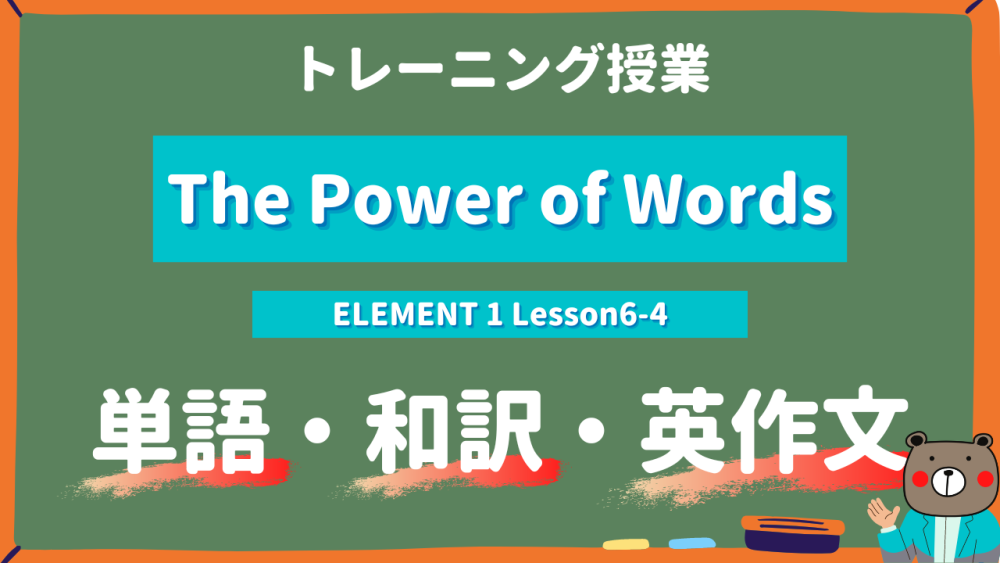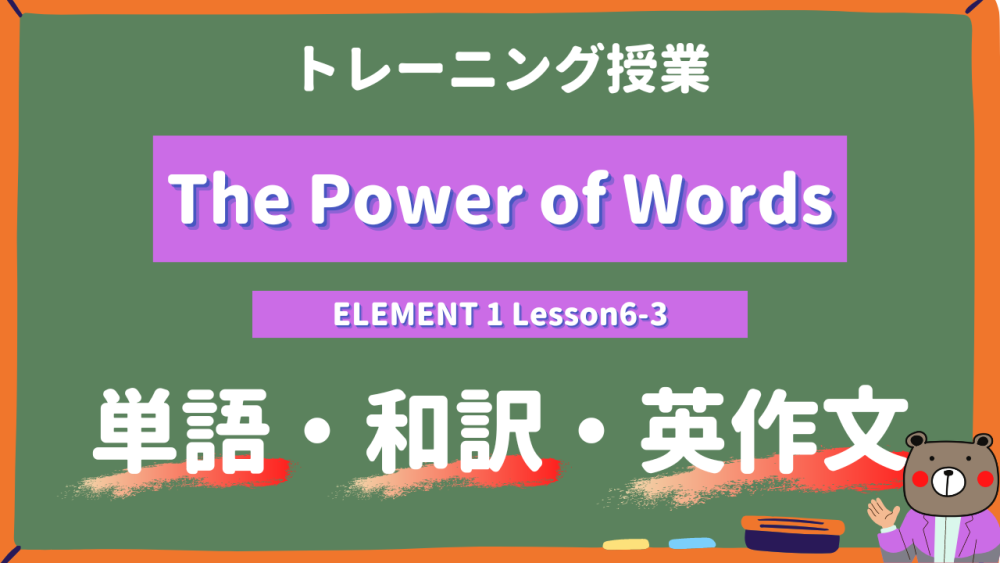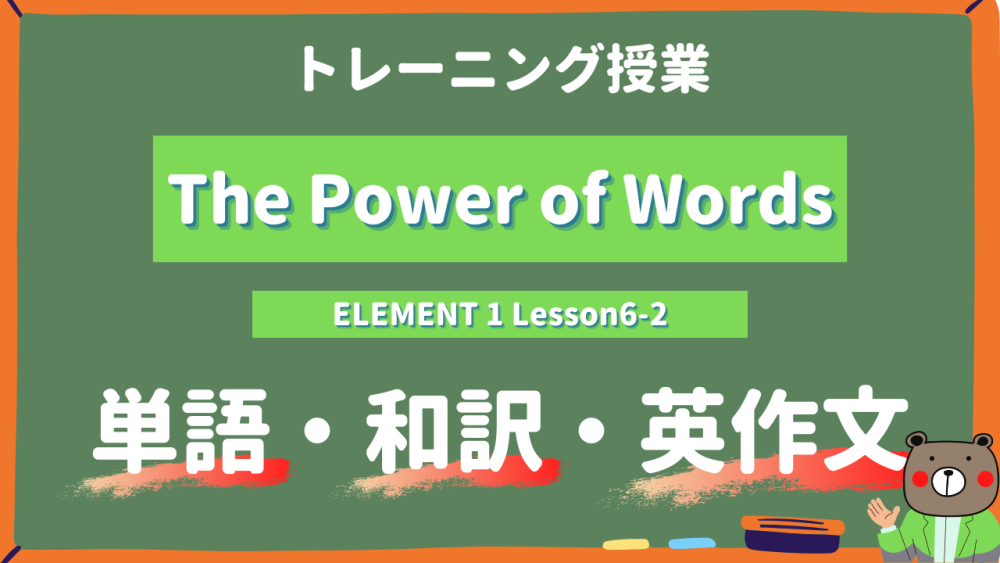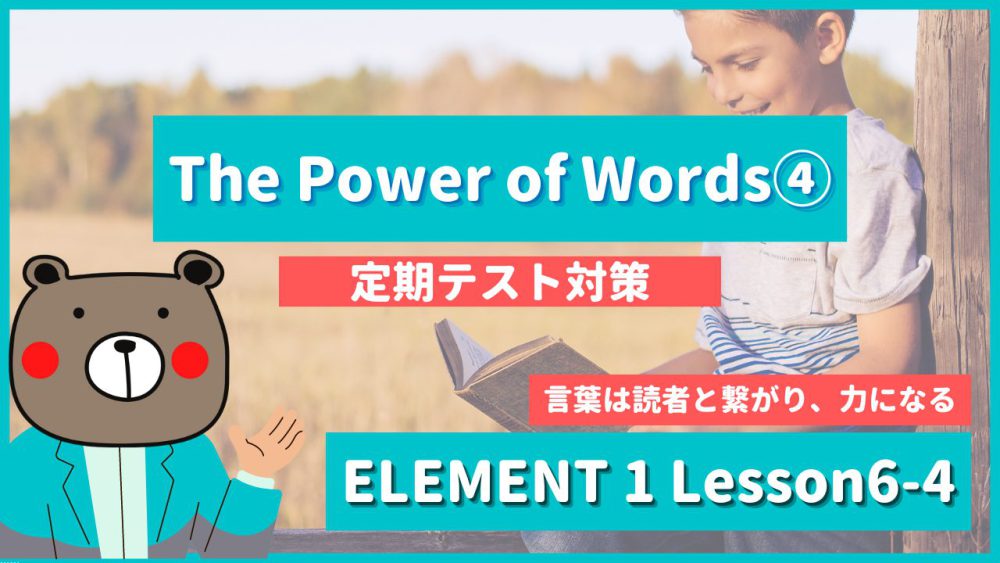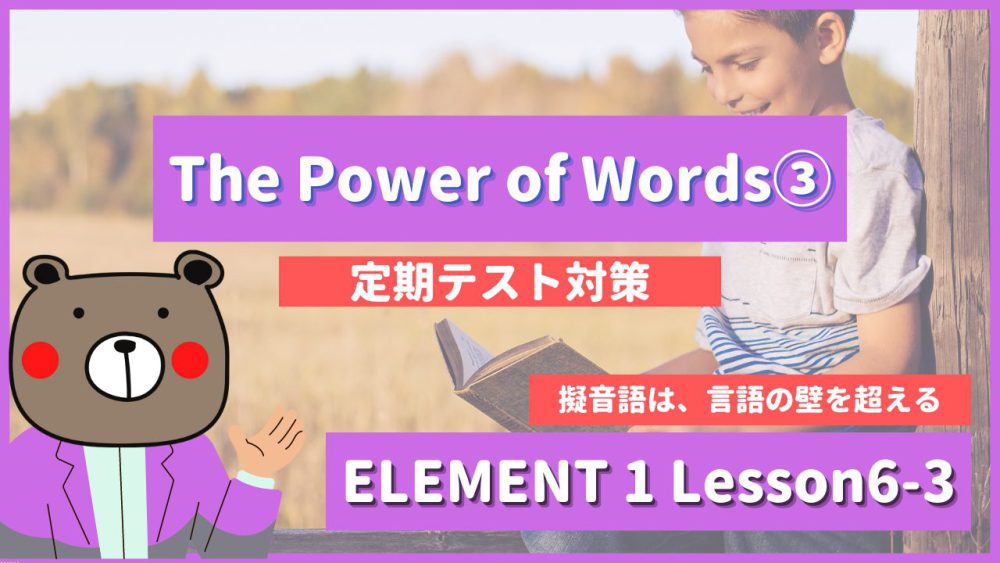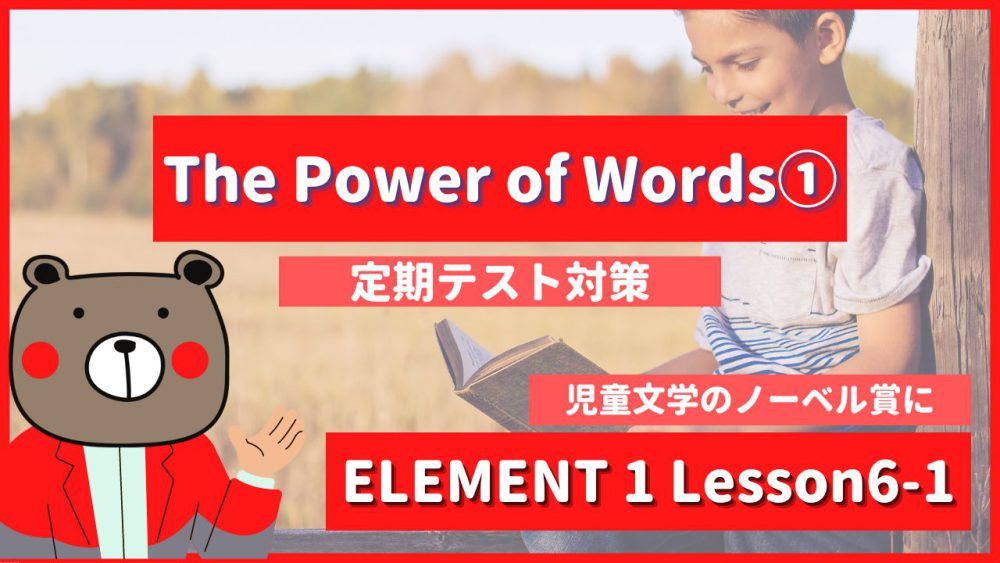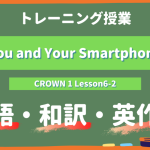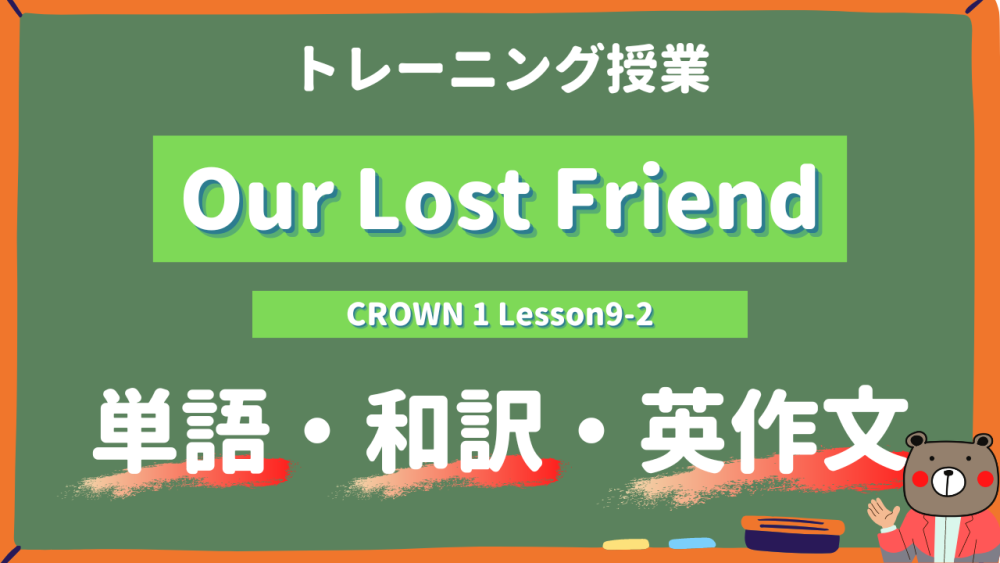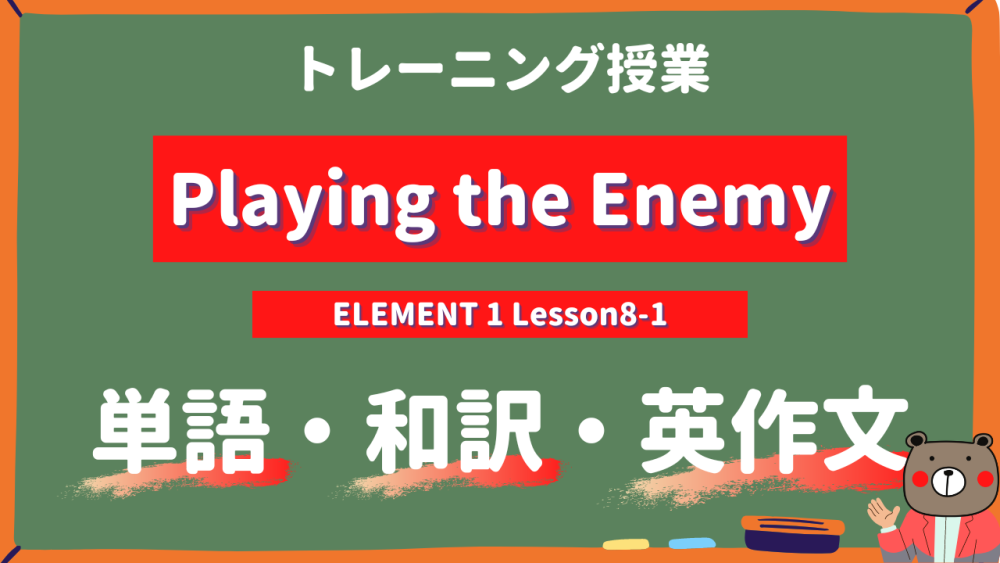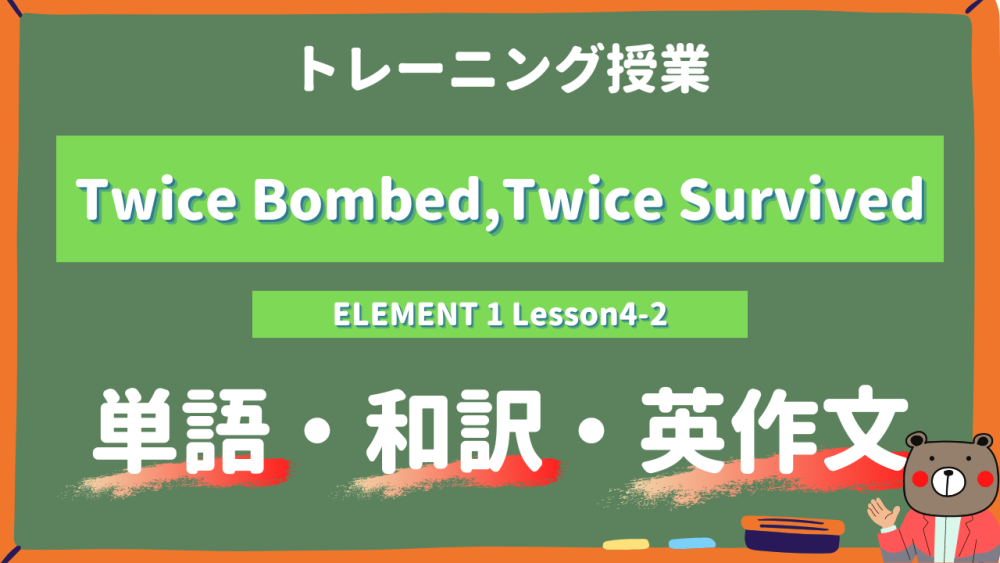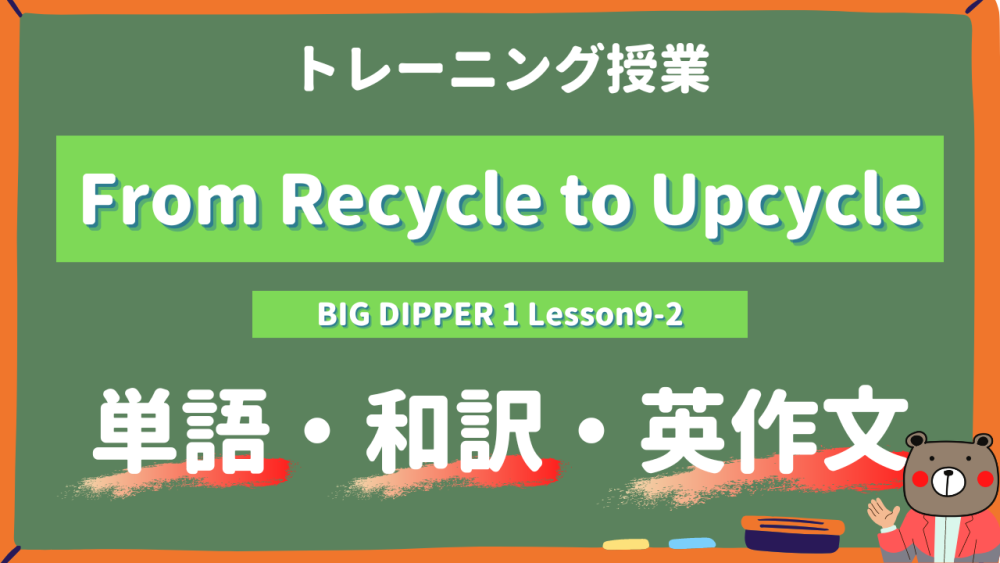▼音声で学びたい方はこちらへ🐻
現在撮影中❗️

▼ELEMENT1-高1《Lesson6》はこちらから🐻
- 授業前にひとこと
- 勉強のポイント
- 本文&和訳
- 重要単語
- 重要ポイント
- 【1】 In Japan, different people use different onomatopoeia for the peach floating down the river when they tell the story.
- 【2】Eiko’s father used donburakok-ko-oh, suk, kok-ko-oh, which has a pleasant rhythm, and she liked listening to it.
- 【3】Even now, those words come back to her.
- 【4】When her work is not going well, she says donburakok-ko-oh, suk, kok-ko-oh unconsciously.
- 【5】When she does so, she can keep writing her story.
- 【6】The words are her magic spell.
- 【7】In everyday life, people hear the songs of birds and the sounds of wind, rain and human life such as walking around, opening doors, and cooking.
- 【8】In Japan, hearing these sounds, people have used their imaginations and created many onomatopoeic phrases.
- 【9】Eiko’s father was really good at creating his own onomatopoeia, which made the stories ever so delightful.
- 【10】Thanks to her father, Eiko came to love stories.
授業前にひとこと


今回も、ELEMENT1-高1《Lesson6》について扱っていきます❗️
Lesson6のタイトルは…🐻
The Power of Words
という「言葉が与えてくれる力」についてのお話です。
ちなみに、このLessonでメインで理解したい文法事項は…
関係代名詞の非制限用法, 分詞構文
です❗️
さて、いつも授業前に説明することですが…
⇧に載せてあります『単語・和訳・英作文トレーニング』をテスト1週間前から毎日やってみてください❗️曖昧な理解がなくなり、成績が爆伸びします!!
コミュ英以外の定期テスト対策は?
現代文の定期テスト対策は こちら から
古文の定期テスト対策は こちら から
漢文の定期テスト対策は こちら から
teite channel をもっと活用する


▷ 解説記事のリクエスト
▷ 新着情報のキャッチ
▷ 定期テスト予想問題
▷ オリジナルグッズの販売
ができるようになっています🐻
teite channel の 公式LINEアカウント はこちら
勉強のポイント
①本文は、角野栄子さんが、父親が投げかけてくれた擬音語で苦しい時を乗り越え、父のおかげで物語を愛するようになったことを理解する。
②単語・重要ポイントをインプットする。
③関係代名詞の非制限用法, 分詞構文について理解する。
本文&和訳
本文(Scene2)
【3】 In Japan, different people use different onomatopoeia for the peach floating down the river when they tell the story.
日本では、その物語を話すとき、それぞれの人々が川を流れている桃にそれぞれの擬音語を使います。
Eiko’s father used donburakok-ko-oh, suk, kok-ko-oh, which has a pleasant rhythm, and she liked listening to it.
栄子の父はどんぶらこっこ、すっこっこを使っていました、そしてそれは心地よいリズムで、彼女はそれを聞くのが好きでした。
Even now, those words come back to her.
今でも、それらの言葉は彼女に返ってきます。
When her work is not going well, she says donburakok-ko-oh, suk, kok-ko-oh unconsciously.
仕事がうまくいっていない時、彼女は無意識にどんぶらこっこ、すっこっこと言います。
When she does so, she can keep writing her story.
彼女がそうするとき、彼女は自分の話を書き続けることができます。
The words are her magic spell.
その言葉は、彼女の魔法のことば(呪文)なのです。
【4】 In everyday life, people hear the songs of birds and the sounds of wind, rain and human life such as walking around, opening doors, and cooking.
毎日の生活の中で、ドアを開けたり料理をしながら、人々は鳥のさえずりや、風、雨の音、そして歩き回るような人の生活音を聞きます。
In Japan, hearing these sounds, people have used their imaginations and created many onomatopoeic phrases.
日本では、これらの音を聞くと、人々は想像力を働かせ、たくさんの擬音語の言葉を生み出してきました。
Eiko’s father was really good at creating his own onomatopoeia, which made the stories ever so delightful.
栄子の父は自分自身の擬音語を創ることがとても上手でした、そしてそれは物語を一層さらに楽しくしました。
Thanks to her father, Eiko came to love stories.
父親のおかげで、栄子は物語が大好きになりました。
重要単語


V : 動詞 , Ving : 動名詞 , Vpp : 過去分詞
| rhythm | リズム |
| come back to ~ | 〜に戻ってくる、帰ってくる |
| go well | うまくいく |
| unconsciously | 無意識に |
| keep Ving | Vし続ける |
| magic | 魔法、魔法の |
| spell | 言葉 |
| such as ~ | 〜のような |
| walk around | 歩き回る、散歩する |
| imagination | 想像力 |
| onomatopoeic | 擬音語の |
| phrase | 言葉 |
| be good at ~ | 〜が上手である |
| delightful | 楽しい |
| thanks to ~ | 〜のおかげで |
| come to V | Vするようになる |
重要ポイント
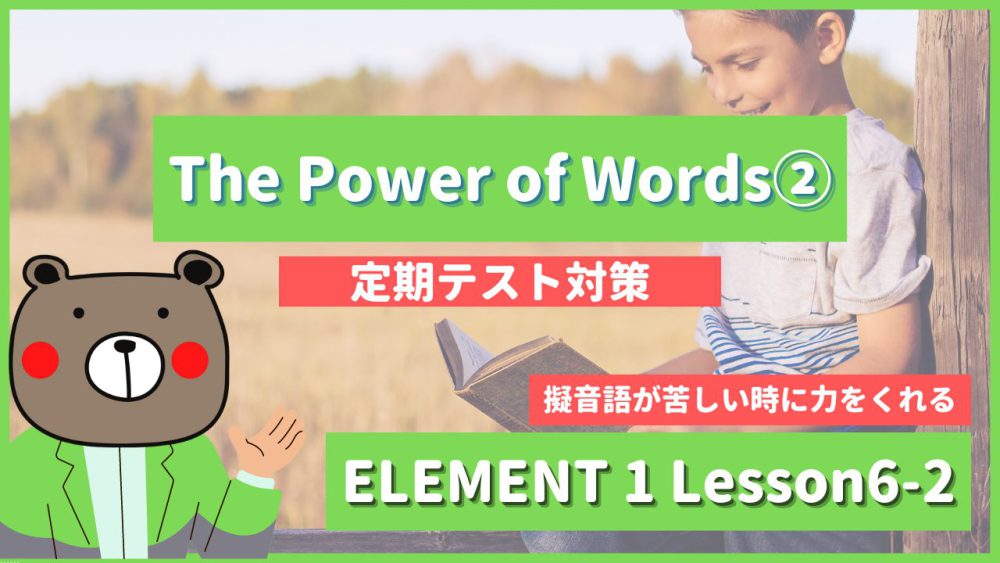

「ピンク」=重要ポイント
▼記号について
V : 動詞 Ving : 動名詞 Vpp : 過去分詞
【 】名詞句・節 〈 〉形容詞句・節 ( )副詞句・節
S:主語 O:目的語 C:補語 M:副詞
【1】 In Japan, different people use different onomatopoeia for the peach floating down the river when they tell the story.
《和訳》
日本では、その物語を話すとき、それぞれの人々が川を流れている桃にそれぞれの擬音語を使います。
《重要ポイント》
ここ意外に長いですね…💦
さて、いつも言うことですが、長ければ理解できる範囲で切りながら考えましょう!


different people use different onomatopoeia = それぞれの人々がそれぞれの擬音語を使います
直訳すると…
「異なった人々が異なった擬音語を使う」となるけど、これが意味することは簡単に言うと「人それぞれ」ってことです。それを訳に入れてみてくださいね❗️
ex. Different people have different desires.
(欲求は人それぞれです)
for the peach floating down the river = 川を流れている桃のための
ここは形容詞句として、前も名詞 onomatopoeia を修飾しています。
つまり、〈川を流れている桃のための〉擬音語
となりますね❗️
あと、floating down the river も分詞の形容詞的用法で、全体で形容詞句の役割をしています。
なので、〈川を流れている〉桃
となります🐻
まとめると…
〈〈川を流れている〉桃 のための〉擬音語
という修飾関係になっています!!
この〈 〉マークは形容詞のカタマリを表す記号です❗️
重要ポイントの一番最初に記号についての説明があるので、混乱している人は確認してね。
when they tell the story = その物語を話すときに
ここは簡単ですね!
ちなみに、the story はもちろん『桃太郎』のことです🍑
ここまで執筆完了❗️日々解説を加えていきます!


teite channel の 公式LINEアカウント はこちら
【2】Eiko’s father used donburakok-ko-oh, suk, kok-ko-oh, which has a pleasant rhythm, and she liked listening to it.
《和訳》
栄子の父はどんぶらこっこ、すっこっこを使っていました、そしてそれは心地よいリズムで、彼女はそれを聞くのが好きでした。
《重要ポイント》
【3】Even now, those words come back to her.
《和訳》
今でも、それらの言葉は彼女に返ってきます。
《重要ポイント》
【4】When her work is not going well, she says donburakok-ko-oh, suk, kok-ko-oh unconsciously.
《和訳》
仕事がうまくいっていない時、彼女は無意識にどんぶらこっこ、すっこっこと言います。
《重要ポイント》
【5】When she does so, she can keep writing her story.
《和訳》
彼女がそうするとき、彼女は自分の話を書き続けることができます。
《重要ポイント》
【6】The words are her magic spell.
《和訳》
その言葉は、彼女の魔法のことば(呪文)なのです。
《重要ポイント》
【7】In everyday life, people hear the songs of birds and the sounds of wind, rain and human life such as walking around, opening doors, and cooking.
《和訳》
毎日の生活の中で、ドアを開けたり料理をしながら、人々は鳥のさえずりや、風、雨の音、そして歩き回るような人の生活音を聞きます。
《重要ポイント》
【8】In Japan, hearing these sounds, people have used their imaginations and created many onomatopoeic phrases.
《和訳》
日本では、これらの音を聞くと、人々は想像力を働かせ、たくさんの擬音語の言葉を生み出してきました。
《重要ポイント》
【9】Eiko’s father was really good at creating his own onomatopoeia, which made the stories ever so delightful.
《和訳》
栄子の父は自分自身の擬音語を創ることがとても上手でした、そしてそれは物語を一層さらに楽しくしました。
《重要ポイント》
【10】Thanks to her father, Eiko came to love stories.
《和訳》
父親のおかげで、栄子は物語が大好きになりました。
《重要ポイント》


これで全て終了です❗️
「ELEMENT1-高1《Lesson6-2 | The Power of Words | p78》」おつかれさまでした🐻
関係代名詞の非制限用法, 分詞構文 だけでなく、知らない熟語や構文が出てきたり、単語のレベルも徐々に上がってきて、少し苦戦しているんではないでしょうか❗️
復習&音読するのをお忘れなく!!
①授業前にひとこと、でも話しましたが…
⇧に載せてあります『単語・和訳・英作文トレーニング』をテスト1週間前から毎日やってみてください❗️曖昧な理解がなくなり、成績が爆伸びします!!
最後まで見てくださってありがとうございました!
またお会いしましょう!定期テストがんばれ〜🐻
じゃあね〜、バイバイ!!
